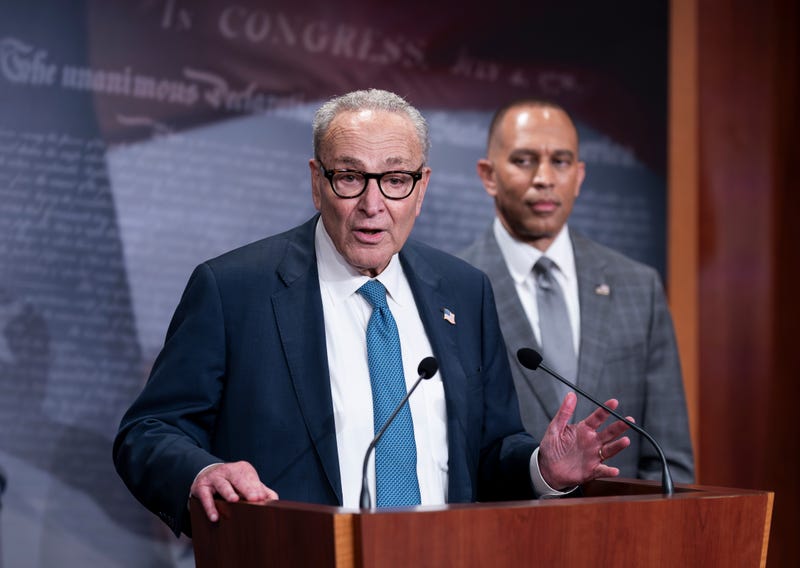
WASHINGTON (AP) — President Donald Trump said Monday that he'd be open to striking a deal with Democrats on the health care subsidies they've made central to the shutdown fight, cracking the door slightly to negotiations that Republicans have said should only happen after the government reopens.
But Trump also said “billions and billions” are being wasted, nodding to arguments from conservatives who do not want the health subsidies extended to lessen the cost of plans offered under the Affordable Care Act, commonly referred to as Obamacare.
“We have a negotiation going on right now with the Democrats that could lead to very good things,” Trump said. “And I’m talking about good things with regard to health care.”
Trump's comments were one of the few hopeful signs Monday as the government shutdown extended to its sixth day. Negotiations between the two parties have been virtually non-existent since the start of the shutdown despite the impact on federal services. Democrats have been urging that Trump get involved, with many saying no deal will be possible without the president's approval.
The two Democratic leaders in Congress, Sen. Chuck Schumer and Rep. Hakeem Jeffries, both denied that there are any negotiations with Trump. Jeffries said the White House "has gone radio silent” since a meeting in the Oval Office last week.
“Trump’s claim isn’t true, but if he’s finally ready to work with Democrats, we’ll be at the table," Schumer said.
Senate Majority Leader John Thune told reporters “there may be a path forward” on ACA subsidies, but stressed: “I think a lot of it would come down to where the White House lands on that.”
More doomed Senate votes
The comments came as the Senate prepared to take another seemingly doomed pair of votes Monday on funding the federal government. Both parties are seeking to ramp up the pressure on the other to end the impasse.
Thune said a critical food aid program for women, infants and children was starting to rule low on funds, blaming Democrats and saying “now it's the American people who are suffering the consequences.”
Schumer said his side was ready to work with Republicans to “reopen the government and end the health care crisis that faces tens of millions of Americans."
"But it takes two sides to have a negotiation,” Schumer said.
Earlier in the day, the two sides dug in. House Speaker Mike Johnson said “there's nothing for us to negotiate” while Jeffries declared the “time is now” to work out a deal on health care.
Johnson, R-La., told reporters that they could stop asking why he wasn't negotiating an end to the impasse and that it was up to a handful of Democrats to “stop the madness” and pass a stopgap spending bill that had earlier passed the House.
“We did the job to keep the government open, and now it's on the Senate Democrats," Johnson said.
The House is not expected to be in session this week, focusing attention on the Senate to take the lead on any deal in the Republican-led Congress. Yet even with House lawmakers away, the Republican and Democratic leaders have been holding almost daily briefings as they frame their arguments and seek to shift blame for the shutdown.
Democrats are insisting on renewing subsidies to cover health insurance costs for millions of households, but Republicans have insisted that can be dealt with later. They say the subsidies are a separate debate than the one on keeping the government funded for a few weeks while the two sides work out their differences on a full-year spending package.
Jeffries said in an NBC “The Today Show” interview Monday that notices have already started to go out to Americans enrolled in health insurance exchanges established through the Affordable Care Act, with those notices showing dramatic increases in premiums next year.
"That’s what people are facing right now, which is why we need to address it,” Jeffries said.
Turmoil for the economy
The stalemate comes at a moment of troubling economic uncertainty. While the U.S. economy has continued to grow this year, hiring has slowed and inflation remains elevated as the Republican president's import taxes have created a series of disruptions for businesses and hurt confidence in his leadership. At the same time, there is a recognition that the nearly $2 trillion annual budget deficit is financially unsustainable.
The Trump administration sees the shutdown as an opening to wield greater power over the budget, with multiple officials saying they will save money as workers are furloughed by imposing permanent job cuts on thousands of government workers, a tactic that has never been used before.
Trump had seemingly suggested Sunday night that layoffs were already taking place, but White House press secretary Karoline Leavitt said Trump was talking about furloughs. Under a furlough, workers cannot report to work, but they will return to their job and get paid retroactively after the shutdown ends. She said layoffs were still planned if the shutdown continues.
The talk of layoffs has escalated an already tense situation in which Washington lawmakers have struggled to find common ground and build mutual trust. Leaders in both parties are betting that public sentiment has swung their way, putting pressure on the other side to cave.
___
Associated Press writers Joey Cappelletti, Mary Clare Jalonick and Lisa Mascaro contributed to this report.